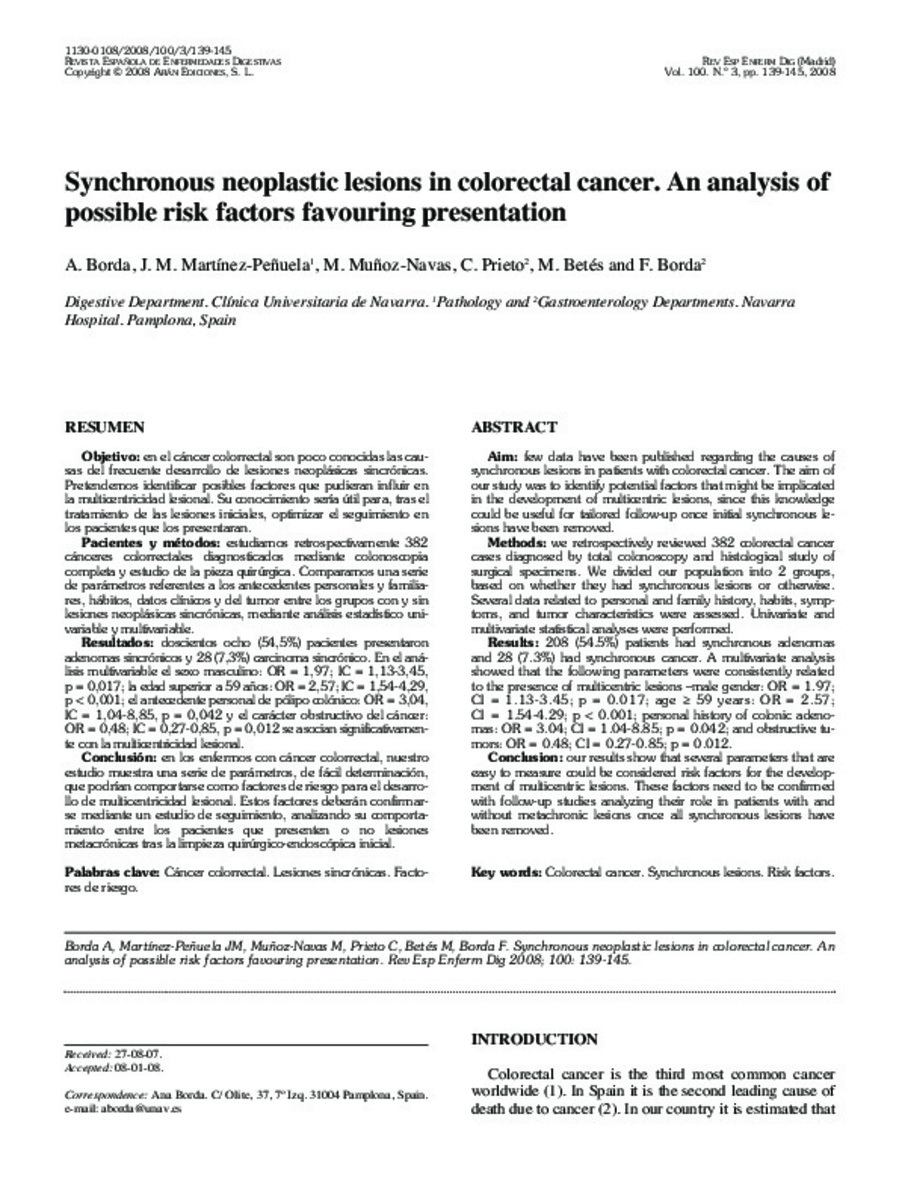Full metadata record
| DC Field | Value | Language |
|---|---|---|
| dc.creator | Borda-Martin, A. (Ana) | - |
| dc.creator | Martinez-Peñuela, J.M. (J.M.) | - |
| dc.creator | Muñoz-Navas, M. (Miguel) | - |
| dc.creator | Prieto-Martínez, C. (Carlos) | - |
| dc.creator | Betes, M.T. (María Teresa) | - |
| dc.creator | Borda-Celaya, F. (F.) | - |
| dc.date.accessioned | 2012-07-02T18:05:20Z | - |
| dc.date.available | 2012-07-02T18:05:20Z | - |
| dc.date.issued | 2008 | - |
| dc.identifier.citation | Borda A, Martinez-Penuela JM, Munoz-Navas M, Prieto C, Betes M, Borda F. Synchronous neoplastic lesions in colorectal cancer. An analysis of possible risk factors favouring presentation. Rev Esp Enferm Dig 2008 Mar;100(3):139-145 | es_ES |
| dc.identifier.issn | 1130-0108 | - |
| dc.identifier.uri | https://hdl.handle.net/10171/22772 | - |
| dc.description.abstract | Aim: few data have been published regarding the causes of synchronous lesions in patients with colorectal cancer. The aim of our study was to identify potential factors that might be implicated in the development of multicentric lesions, since this knowledge could be useful for tailored follow-up once initial synchronous lesions have been removed. Methods: we retrospectively reviewed 382 colorectal cancer cases diagnosed by total colonoscopy and histological study of surgical specimens. We divided our population into 2 groups, based on whether they had synchronous lesions or otherwise. Several data related to personal and family history, habits, symptoms, and tumor characteristics were assessed. Univariate and multivariate statistical analyses were performed. Results: 208 (54.5%) patients had synchronous adenomas and 28 (7.3%) had synchronous cancer. A multivariate analysis showed that the following parameters were consistently related to the presence of multicentric lesions –male gender: OR = 1.97; CI = 1.13-3.45; p = 0.017; age ≥ 59 years: OR = 2.57; CI = 1.54-4.29; p < 0.001; personal history of colonic adenomas: OR = 3.04; CI = 1.04-8.85; p = 0.042; and obstructive tumors: OR = 0.48; CI = 0.27-0.85; p = 0.012. Conclusion: our results show that several parameters that are easy to measure could be considered risk factors for the development of multicentric lesions. These factors need to be confirmed with follow-up studies analyzing their role in patients with and without metachronic lesions once all synchronous lesions have been removed. | es_ES |
| dc.language.iso | eng | es_ES |
| dc.publisher | The Spanish Society of Digestive Pathology | es_ES |
| dc.rights | info:eu-repo/semantics/openAccess | es_ES |
| dc.subject | Colorectal cancer | es_ES |
| dc.subject | Synchronous lesions | es_ES |
| dc.subject | Risk factors | es_ES |
| dc.title | Synchronous neoplastic lesions in colorectal cancer. An analysis of possible risk factors favouring presentation | es_ES |
| dc.type | info:eu-repo/semantics/article | es_ES |
| dc.relation.publisherversion | http://www.grupoaran.com/mrmUpdate/lecturaPDFfromXML.asp?IdArt=460381&TO=RVN&Eng=1 | es_ES |
| dc.type.driver | info:eu-repo/semantics/article | es_ES |
Files in This Item:
Statistics and impact
Items in Dadun are protected by copyright, with all rights reserved, unless otherwise indicated.






